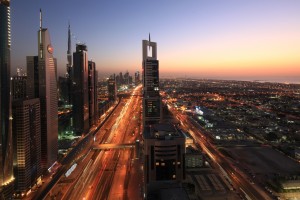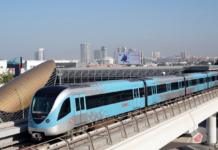By Sanjay Kapoor www.thaindian.com
There was no surprise in the United Arab Emirate (UAE) when predictably Abu Dhabi’s ruling family decided to throw a lifeline to a debt-strapped Dubai. Although, Abu Dhabi’s help to its neighbor was expected by emirate watchers, there is growing unanimity that the recovery of the desert kingdom from its financial problems would remain a distant mirage.

A couple of days before Dubai World asked for a standstill agreement from its debtors, a senior diplomat had told this writer that Abu Dhabi would not let Dubai sink, but this liberal oasis of the Arabian desert would not be the same again.
Plenty of physical indicators are visible of the difficult task the Dubai rulers have to pull out of their over leveraged city state, described by a growing legion of detractors as “Legoland” or “Neverland”.
Evidence of the misery the global economic slowdown has heaped on a city that dizzyingly grew in the last ten years can be seen while traveling in the spankingly new driver-less elevated Dubai metro that traverses a distance of 53 km and runs along many of Dubai high-rises, buildings and malls. There is a surreal normalcy to this desert city with cars whizzing at great speed along the highways till someone points at the ‘To let’ signs on buildings or at random car parks where fleeing debt-strapped expatriates have left their vehicles behind to escape the law and its stubborn enforcers.
Defaulting on loans is a serious crime here and it can land people in jail. Therefore for recession-impacted jobless expatriates that could mean a dangerous pause in hell.
Dubai surely is unwinding after a long party, and there are few to pick up the tab.
Dubai’s Mall of Emirates, one of the showpieces of this kingdom’s in-your-face hedonism, has fewer footfalls. There are fancy sales on electronic goods that are available all around. Despite this, there are few customers. “Yes not many people are showing up,” informs an Indian salesman.
For long years Dubai was part of a South Asian dream. For all those people mired in joblessness and poor purchasing power, a ticket to the Middle East was a passport to prosperity. Millions of South Asians escaped poor governance and the failure of their governments to industrialize and create jobs by crossing the large mass of water to work at construction sites in hot and inhospitable deserts.
Surely, the remuneration was far more than the pain that they experienced while working in strange and distant lands. Economies of states like Kerala have been sustained by remittances from the Gulf. Other countries of South Asia also benefited from the construction boom.
There are thousands of Pakistanis, Bangladeshis and Sri Lankans who work here. Many of them live in inhospitable conditions and have been at the mercy of cruel contractors. By a rough estimate 1.5 million Indians work in UAE. There are many more from other countries.
Dubai, unlike its savior, Abu Dhabi, does not have oil or gas to bankroll its lavish projects. It grew due to the tension between India and Pakistan and later due to two Iraq wars. In an environment of easy money, it tried to leverage its fancy projects to attract rich money bags that invest here.
Dubai followed a simple mantra: build and build and the world would follow with their money. So when global slowdown savaged economies all over the world, one of the collateral casualties was Dubai. For no fault of its own, its grand plans ground to dust as there were no takers for its tallest, biggest, richest properties. Suddenly, the city’s ubiquitous cranes stopped. Projects came to a standstill. Many workers left for their homes, but a lot of them just drove two hours to Abu Dhabi – the new El-Dorado.
Quite evidently, locus of power in the Gulf was shifting from loud and ostentatious Dubai to a conservative Abu Dhabi. Unlike, Dubai, Abu Dhabi is sitting on a large pool of oil and gas. It has 4 percent of world oil and a lot of gas. Abu Dhabi has been investing money. It is trying to be the cultural hub of Arabia by setting up Louvre, Guggenheim Museum and a green city called Masdar, besides a top range Formula 1 motorway in Yas Island.
The UAE government based in Abu Dhabi is also trying to enlarge the democratic process in the Emirate and promoting press freedom. A new newspaper that it supports, ‘The National’ has keen reporting and quality production. Interactions of this writer with UAE ministers showed that they were unfazed by the recession and were confident that the city state would emerge unscathed.
Abu Dhabi is experiencing a boom in real estate. Since Dubai went on pause mode, many professionals have shifted here catapulting real estate prices to a new level. In some ways, Abu Dhabi, too, is suffering from a high rent malaise that had earlier driven ordinary people out of Dubai city to distant desert townships.
Where do these happenings leave the Indians? If Overseas Indian Affairs Minister Vayalar Ravi’s reply is anything to go by, then not many workers have lost their jobs and come back to India.
This is not true. There is plenty of anecdotal evidence of workers coming back home in hordes. Any flight from the Gulf would testify to this suggestion. The reason why this is not causing much disquiet is that the Indian economy is in a better position to absorb skilled construction labourers now than 10 years ago.
(20-12-2009 Sanjay Kapoor is the editor of Hardnews Magazine. His reports on Dubai can be read in www.hardnewsmedia.com )
















